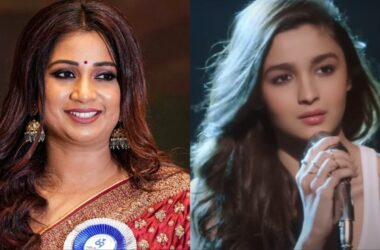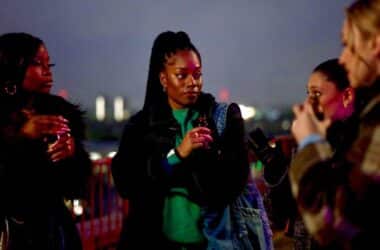Kiran Bedi (born 9 June 1949) is an Indian social activist, former-tennis player who became the first woman in India to join the officer ranks of the Indian Police Service (IPS) in 1972 and was the 24th Lieutenant Governor of Puducherry from 28 May 2016 to 16 February 2021.

Kiran Bedi (born 9 June 1949) is an Indian social activist, former-tennis player who became the first woman in India to join the officer ranks of the Indian Police Service (IPS) in 1972 and was the 24th Lieutenant Governor of Puducherry from 28 May 2016 to 16 February 2021.
As a teenager, Bedi was crowned the national junior tennis champion in 1966. Between 1965 and 1978, she won several titles at various national and state-level championships. After joining the IPS, Bedi served in Delhi, Goa, Chandigarh and Mizoram. She started her career as an Assistant Superintendent of Police (ASP) in the Chanakyapuri area of Delhi, and won the President's Police Medal in 1979. Next, she moved to West Delhi, where she brought about a reduction in crimes against women. Subsequently, as a traffic police officer, she oversaw traffic arrangements for the 1982 Asian Games in Delhi and the Commonwealth Heads of Government Meeting 1983 in Goa. As Deputy Commissioner of Police of North Delhi, she launched a campaign against drug abuse, which evolved into the Navjyoti Delhi Police Foundation (renamed to Navjyoti India Foundation in 2007).

In May 1993, Bedi was posted to the Delhi Prisons as Inspector General (IG). She introduced several reforms at Tihar Jail, which won her the Ramon Magsaysay Award in 1994. In 2003, Bedi became the first Indian and first woman to be appointed head of the United Nations Police and Police Advisor in the United Nations Department of Peace Operations. She resigned in 2007, to focus on social activism and writing. She runs the India Vision Foundation. During 2008–11, she hosted a court show Aap Ki Kachehri. She was one of the key leaders of the 2011 Indian anti-corruption movement, and joined the Bharatiya Janata Party (BJP) in January 2015. She unsuccessfully contested the 2015 Delhi Assembly election as the party's Chief Ministerial candidate.

Kiran Peshawaria was born on 9 June 1949 in Amritsar, East Punjab, Dominion of India, into a Punjabibusiness family. She is the second child of Prakash Lal Peshawaria and Prem Lata (born Janak Arora).[5]She has three sisters: Shashi, Reeta, and Anu.[6] Her great-great-grandfather Lala Hargobind had migrated from Peshawar to Amritsar, where he set up a business. Bedi's upbringing was not very religious, but she was brought up in both Hindu and Sikh traditions (her grandmother was a Sikh, although her other family members were Hindu).[7] Prakash Lal helped with the family's textile business, and also played Tennis. Bedi's grandfather Muni Lal controlled the family business and gave an allowance to her father. He cut this allowance when Bedi's elder sister Shashi was enrolled in the Sacred Heart Convent School, Amritsar. Although the school was 16 km away from their home, Shashi's parents believed it offered a better education than other schools. Muni Lal was opposed to his grandchild being educated in a Christian school.
 However, Prakash Lal declared financial independence and enrolled all his daughters, including Kiran, in the same school. Bedi started her formal studies in 1954, at the Sacred Heart Convent School in Amritsar. She participated in National Cadet Corps (NCC), among other extra-curricular activities. At that time, Sacred Heart did not offer science; instead, it had a subject called "household", which was aimed at grooming girls into being good housewives. When she was in Class 9, Bedi joined Cambridge College, a private institute that offered science education and prepared her for matriculation exam. By the time her former schoolmates at Sacred Heart cleared Class 9, she cleared the Class 10 (matriculation) exam. Bedi graduated in 1968, with a Bachelor of Arts (Honours) in English, from Government College for Women at Amritsar. The same year, she won the NCC Cadet Officer Award. In 1970, she obtained a Master's degree in Political Sciencefrom Panjab University in Chandigarh. From 1970 to 1972, Bedi taught as a lecturer at Khalsa College for Women in Amritsar. She taught courses related to political science. Later, during her career in the Indian Police Service, she also earned a Bachelors of Law degree from the Faculty of Law, University of Delhi in 1988 and a Doctorate of Philosophy from the Indian Institute of Technology – Delhi's Department of Social Sciences in New Delhi in 1993.
However, Prakash Lal declared financial independence and enrolled all his daughters, including Kiran, in the same school. Bedi started her formal studies in 1954, at the Sacred Heart Convent School in Amritsar. She participated in National Cadet Corps (NCC), among other extra-curricular activities. At that time, Sacred Heart did not offer science; instead, it had a subject called "household", which was aimed at grooming girls into being good housewives. When she was in Class 9, Bedi joined Cambridge College, a private institute that offered science education and prepared her for matriculation exam. By the time her former schoolmates at Sacred Heart cleared Class 9, she cleared the Class 10 (matriculation) exam. Bedi graduated in 1968, with a Bachelor of Arts (Honours) in English, from Government College for Women at Amritsar. The same year, she won the NCC Cadet Officer Award. In 1970, she obtained a Master's degree in Political Sciencefrom Panjab University in Chandigarh. From 1970 to 1972, Bedi taught as a lecturer at Khalsa College for Women in Amritsar. She taught courses related to political science. Later, during her career in the Indian Police Service, she also earned a Bachelors of Law degree from the Faculty of Law, University of Delhi in 1988 and a Doctorate of Philosophy from the Indian Institute of Technology – Delhi's Department of Social Sciences in New Delhi in 1993.
 Inspired by her father, Bedi started playing tennis at the age of nine. As a teenage tennis player, she cut her hair short as it interfered with her game. In 1964, she played her first tournament outside Amritsar, participating in the national junior lawn tennis championship at Delhi Gymkhana. She lost in early rounds, but came back to win the trophy two years later, in 1966. As the national champion, she was eligible for entry to the Wimbledon junior championship, but was not nominated by the Indian administration.
Inspired by her father, Bedi started playing tennis at the age of nine. As a teenage tennis player, she cut her hair short as it interfered with her game. In 1964, she played her first tournament outside Amritsar, participating in the national junior lawn tennis championship at Delhi Gymkhana. She lost in early rounds, but came back to win the trophy two years later, in 1966. As the national champion, she was eligible for entry to the Wimbledon junior championship, but was not nominated by the Indian administration.

As a young woman, Bedi frequented the Service Club in Amritsar, where interaction with senior civil servants inspired her to take up a public service career. On 16 July 1972, Bedi started her police training at the National Academy of Administration in Mussoorie. She was the only woman in a batch of 80 men, and became the first woman IPS officer. After a 6-month foundation course, she underwent another 9 months of police training at Mount Abu in Rajasthan, and further training with Punjab Police in 1974. Based on a draw, she was allocated to the union territory cadre (now called AGMUT or Arunachal Pradesh–Goa–Mizoram-Union Territories cadre).
 Chanakyapuri was an affluent area that included the Parliament building, foreign embassies, and the residences of the Prime Minister and the President. The crimes in the area were mainly limited to minor thefts, but political demonstrations (which sometimes turned violent) were a regular occurrence. During the 1970s, there were many clashes between Nirankari and Akali Sikhs. On 15 November 1978, a group of Nirankaris held a congregation near India Gate. A contingent of 700–800 Akalis organized a demonstration against them. DCP Bedi's platoon was deployed to stop the protesters and prevent violence. As the protesters resorted to brick-batting, Bedi charged them with a cane, although there was no tear gas squad to support her unit. One of the demonstrators ran towards her with a naked sword, but she charged him as well as other demonstrators with a cane. Ultimately, her unit was able to disperse the demonstrators. For this action, Bedi was awarded the President's Police Medal for Gallantry (1979), in October 1980.
Chanakyapuri was an affluent area that included the Parliament building, foreign embassies, and the residences of the Prime Minister and the President. The crimes in the area were mainly limited to minor thefts, but political demonstrations (which sometimes turned violent) were a regular occurrence. During the 1970s, there were many clashes between Nirankari and Akali Sikhs. On 15 November 1978, a group of Nirankaris held a congregation near India Gate. A contingent of 700–800 Akalis organized a demonstration against them. DCP Bedi's platoon was deployed to stop the protesters and prevent violence. As the protesters resorted to brick-batting, Bedi charged them with a cane, although there was no tear gas squad to support her unit. One of the demonstrators ran towards her with a naked sword, but she charged him as well as other demonstrators with a cane. Ultimately, her unit was able to disperse the demonstrators. For this action, Bedi was awarded the President's Police Medal for Gallantry (1979), in October 1980.
In the 1980s, Bedi attracted ire of Delhi politicians and lawyers. First, she ordered lathi charge on a Bharatiya Janata Party (BJP) assembly in Red Fort area, and arrested its leaders. A few months later, she arrested Congress(I) MP J.P. Agarwal for violating curfew orders.[
In January 1988, the Delhi Police caught a man stealing from a girl's purse at St. Stephen's College. A few weeks later, he was arrested again for trespassing into a women's toilet and writing obscene graffiti inside. One of Bedi's officers arrested and handcuffed]] the man. When he was produced in the court, he was recognized as Rajesh Agnihotri, a lawyer practicing at the Tis Hazari Courts Complex. The man had given a different name when he was arrested, and his lawyer colleagues claimed that he had been falsely framed. The protesters also argued that lawyers must not be handcuffed even if there are proper grounds for their arrest. Bedi vociferously defended her officer's action. The lawyers organized a strike and led a procession to DCP (North) office. Not finding DCP Bedi at the office, the lawyers manhandled Additional DCP Sandhu. This led to a scuffle between the cops and the lawyers. The lawyers escalated their strike, and several politicians supported the lawyers in demanding suspension of Bedi.
[zombify_post]











